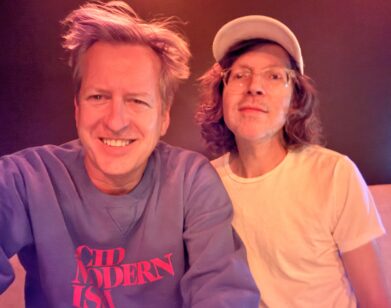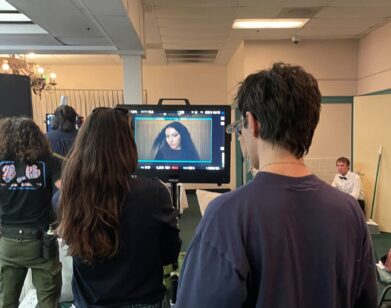IN CONVERSATION
Brat is Gabriel Smith’s “Haunted House Benzo Novel.” Not to Be Confused With Charli XCX.
“I’ve never heard of you. good luck with your book tho !” wrote Charli XCX last February in a quip directed toward the writer Gabriel Smith, the mastermind behind a fabricated email on X, formerly Twitter, claiming the cult-favorite pop star had requested to borrow the title of his debut novel for her own record, released last week to critical and commercial acclaim. Though the rumors have since been dispelled, the savvy publicity stunt speaks to Smith’s clever and creative approach to form (and, I suppose, marketing).
In his debut, of the now infamous title, Brat, Smith’s narrator, a 20-something writer also named Gabriel, ruminates on grief, loss, and memory in ways that push the novel’s form into new territories, borrowing from U.K post-rave music’s “sample-driven” approach. His “staccato” prose, as he described it to fellow debut novelist Eliza Callahan, is well-suited to the scattershot, ADHD-riddled, modern mind. Yet despite the book’s proximity to the confessional, Smith resists the categorization of autofiction, instead aligning himself with the literary tradition of gothic horror. “I knew I wanted to do a haunted house benzo novel,” he told Callahan, who earlier this year released her debut novel The Hearing Test, a book that similarly grapples with loss after its narrator, aimless and in the throes of depression, wakes up with sudden deafness. Over Zoom last week, the authors linked up to discuss their respective mentors, writing to the music of Brian Eno, and, of course, Charli XCX.—LILY KWAK
———
ELIZA CALLAHAN: Are you in England right now?
GABRIEL SMITH: No, I’m in New York. Where are you?
CALLAHAN: I’m also in New York. Do you live in England or do you live in New York now?
SMITH: Yeah, I live in London.
CALLAHAN: I’m interested in hearing about your relationship to where the novel is set, which is just outside of London, right?
SMITH: Yeah. You have commuter towns here as well, right?
CALLAHAN: Like… Westchester.
SMITH: Yeah, there’s the commuter belt in London and the home counties where people move to once they’ve earned enough money in London and it’s full of really terrible people in these big houses that become empty once the children leave. They’re deeply unsettling. I grew up in a place just like that.
CALLAHAN: Okay, so that was my question.
SMITH: Yeah. It’s like, houses that belong to my richer friends, basically.
CALLAHAN: Perfect. I was interested in your relationship to the site. And you live in London now?
SMITH: I do, yeah, since I was 18.
CALLAHAN: Okay. I love London.
SMITH: You’re a New Yorker through and through, right?
CALLAHAN: I am. I’ve never left. I should, probably.
SMITH: Are you going to?
CALLAHAN: I should get out of here at some point. But no real plans are on the immediate horizon. I teach now in the city as well.
SMITH: What do you teach, writing stuff?
CALLAHAN: Writing stuff, yeah. I teach at Columbia in the undergraduate writing program.
SMITH: My mother does that.
CALLAHAN: So your mother’s a writer? Do you come from a family of writers?
SMITH: My mother, my grandmother, and then one every generation on my mother’s side back to Jane Austen, who’s my sixth great aunt or something.
CALLAHAN: Wow.
SMITH: What about you? Is it in your blood?
CALLAHAN: It actually isn’t. There’s a touch of it, though. My grandfather was a journalist and he wrote a novel. My mother’s a veterinarian. My dad has a restaurant, worked in nightclubs.
SMITH: I feel like people who work with the body, even animal bodies, make good writers. The fucking Mad Max guy was a doctor for years.
CALLAHAN: That’s interesting. I think my dad maybe could have been a writer. His texts are writerly in some way, this kind of impressionistic correspondence. He’s got the gift of the gab, for sure. And as I said, my grandfather wrote a novel that wasn’t completed. He died really young. He hit his head while getting into a taxi.
SMITH: Oh, damn. Like on the roof?
CALLAHAN: I’m not sure. This is like, 1960. He was a foreign correspondent for the Times covering the Kashmir conflict, so my dad lived in Pakistan for the first seven years of his life.
SMITH: Oh, no shit. That’s sick.
CALLAHAN: The manuscript is just sitting somewhere. So I’m kind of curious…
SMITH: You’ve got to find that.
CALLAHAN: Your book actually made me want to dredge up some of the family writings. I felt like it was arranged in what felt like this very massive chest of little drawers, which are kind of opened and closed again. I wondered if you could speak a bit to the way you were thinking about form in relation to content.
SMITH: Well, to answer that backwards, I have obscenely bad ADHD. Sitting in one drawer for a long time does not appeal to me. I don’t think I could have done it that way. I really admire people who can write a whole book about being in a lift or whatever, but I couldn’t not jump between drawers. I don’t know what your process is, but I’m a 500 words in the morning guy, which always ends up defining the structure more than you expect. Splurges are better at staying on topic, maybe. I’ve forgotten the first half of the question…
CALLAHAN: Well, the form in relation to the content. I thought it felt like this translation of grief as a form. Something about the repetition or the rumination, the deterioration, the haunting of grief. The form just beautifully suited the content. So I was curious how you were thinking of it.
SMITH: Oh, absolutely. Very few of my friends read and they have attention spans as short as mine. So I knew for them to actually enjoy it, it had to move along really fast and be very staccato. But that is also how one experiences grief. I knew I wanted to do a haunted house benzo novel. I don’t know if you’ve taken a lot of those, but over a period of time, that’s just how your brain works, because you lose medium and long-term memory and you’re very in the moment. Grief does the same thing, where it kind of dulls. You just don’t want to be in the past at all because it’s so painful.
CALLAHAN: There’s so many moments of really beautiful present-ness and being in a space, just catching the air. I felt an awareness that you only have when you’re in this total state of grief.
SMITH: One of my rules was that the protagonist is allowed a memory every 50 pages, otherwise he doesn’t have thoughts that aren’t actions, basically.
CALLAHAN: I was wondering about that…
SMITH: That was very specific.
CALLAHAN: This is a digression, but are you familiar with “The Disintegration Loops,” this William Basinski piece?
SMITH: I learned about it during the first month I was writing this, actually. I was thinking about Brian Eno a lot. I embarrassed myself the other day by asking an interviewer if they knew about–
CALLAHAN: Brian Eno.
SMITH: Right. They were an audio engineer at some point in their life and I was like, “Do you know who he is?”
CALLAHAN: They’re like, “Fuck you.”
SMITH: [Laughs] So there’s one where he has different length loops and then just lets them play out. Then harmony and story are made using that. So I was thinking about that a lot. I was like, “I want to write the book version of this.”
CALLAHAN: That’s so funny. I was thinking a lot about that as I wrote my project. Before even the disintegration or the shifting tape appeared in your text, I was already thinking about it.
SMITH: That’s brilliant. I’m so happy to hear that. Your book reminded me of that too, but for more concrete reasons.
CALLAHAN: We’ve got to get Basinski in the room.
SMITH: That piece is so good for writing, isn’t it?
CALLAHAN: Yes. I edited to it a lot, actually. My partner was like, “I can’t fucking hear that ever again.” But I could listen to it till the end of time.
SMITH: What were you listening to other than that?
CALLAHAN: I was actually listening to a lot of Brian Eno also. I was listening to Laurie Spiegel. She’s great. She’s New York-based, an early computer music person. She did the “Expanding Universe” tapes.
SMITH: I’ll check that out. By the way, do you mind people talking about the protagonist in your book as you? Like, what’s your ideal with that?
CALLAHAN: I feel really related to that protagonist, but I kind of bristle at the auto fiction of it all.
SMITH: You don’t have to say that word. It’s okay.
CALLAHAN: But I gave her my name…
SMITH: Yeah. I mean, I was listening to loads of The Fool.
CALLAHAN: I love The Fool. That feels correct for your narrator.
SMITH: I love that pathetic, punk type thing.
CALLAHAN: What does your narrator listen to?
SMITH: He only listens to Burial in the whole novel.
CALLAHAN: That’s perfect. Okay, I have some more questions about your book. When the book opens, the narrator has lost his father. There’s the funeral. His mother’s sick, lives in a care home, her memory’s failing. He’s also just been left by his girlfriend. So it’s a text that translates a process of metabolizing the reality of these losses in real time. It does this spiritually, but then it also does this literally within the book, in that there are swaths of writing about the people he’s lost. The document is swallowing or metabolizing other documents, it’s filled up with the things he’s lost or is losing. I just wonder if you could speak to that.
SMITH: I think a big part of it was just purely mechanical, making something that was readable, because he’s such a blank slate. And if it didn’t spiral out into these other narratives that had more voice, it would’ve been completely unreadable. You couldn’t spend a whole novel with that guy.
CALLAHAN: Well, I could have.
SMITH: Thank you. But he’s abrasive and his voice is meant to be abrasive. This might be a dumb guy thing to say, and I don’t know my Greek myths, but is it Orpheus who has to go down to hell to get his girl back or whatever?
CALLAHAN: I’ll be the dumb girl and not know.
SMITH: I think it’s Orpheus. He walks back up the stairs. He looks back. He can hear her footsteps, so obviously he looks back. So grief is an incredibly tangible memory, the sound of footsteps is just so painfully present and yet the moment you look at it, it’s just gone. So I filled the book with that as much as possible, people who he’s grieving or is about to grieve or knows he will grieve. That was really important in making the reader understand it. Otherwise, it wouldn’t have been tangible.
CALLAHAN: Well, you made this feeling of absence so beautifully tangible. And that was also done in relation to the writing of the body, which felt like this really wonderful experiential annotation— this feeling of extreme closeness to oneself, but also being outside of oneself. Somehow, he was able to become a spectator to his own body.
SMITH: Well, being betrayed by the body is just such a horror, isn’t it?
CALLAHAN: Yeah. The betrayal of the body, too.
SMITH: Did people talk about your novel as a body horror novel when it came out?
CALLAHAN: I was like, “Oh, this feels like a book about falling out of love or something.” And the hearing loss element was just a starting point to something.
SMITH: Of course. Well, it’s a great hook for a novel.
CALLAHAN: The thing is, they don’t read it or accept it as a novel, even though so much of it was fictional. They have a hard time with that.
SMITH: I think people only do that to women generally, and it’s so fucking misogynistic. Like, no one does that to boy writers.
CALLAHAN: They did it to me.
SMITH: It’s fucking pathetic, honestly.
CALLAHAN: I have more questions for you.
SMITH: Shoot.
CALLAHAN: You mentioned your mentor, Gian, and I just was curious about that relationship, what that looked like and how it started. It’s very nice that you honor him in the bio, which is a rare place to see something so visibly meaningful to you.
SMITH: Did you guys know each other?
CALLAHAN: I’ve met him in passing, but I didn’t know him.
SMITH: So the story was based on the first story I read. I sent it to Jordan Castro, who was editing Tyrant Magazine at the time, just because that’s what got me into books, full stop. I thought books were stupid because it was my parents’ thing and I really didn’t want to do that. Then I started reading Tyrant when I was 16 or 17 and from then to age 24, when I wrote that first story, he was just my hero and I was in awe of everything he did. It was so cool and punk. Tyrant published that first story. And then I wrote this book the next summer, in 2019 or something, and it felt too English and structured to fit within the Tyrant extended universe. So I sent it to Gian, just at the Tyrant email address, being like, “Hey, this came from a story you guys published. I literally just want your blessing.” And a couple of weeks later, he started emailing me nice things about it and was like, “Come to Italy, let’s edit it together,” which I obviously did. I spent a month out there just trying to take in as much information as possible. He just exuded chill and coolness and was so helpful. We were really close. And then he passed in March 2021, just after I’d sent him what were probably going to be the last edits. Did you have a figure like that?
CALLAHAN: I was in a grad program and I had a mentor figure, the writer Kate Zambreno.
SMITH: Well, they’re wonderful.
CALLAHAN: I was going to leave the program. I just felt like everyone was writing novels and I wasn’t there to write a novel. Buit Kate was like, “You started a novel…” I had written a two-page fictional essay. I was losing my hearing at that time and the book just kind of began as this semi-fictional, experiential log. Kate ushered me into the world with the people that she’d worked with. She introduced me to them. She has opened every door for me.
SMITH: These people are incredible, right? Do you think you’ll be not self-centered enough to pay it back? I can’t imagine myself in 20 years time helping other people. It’s so selfless.
CALLAHAN: I don’t know. I mean, I love teaching. If you’re drawn to something enough, then you feel genuine excitement. So it’s maybe not even about going a good deed, but the urge to bring something forth. Maybe that’s just a nicer way to think about it…
SMITH: That’s probably right.
CALLAHAN: So I’m definitely not one for categories, but I was wondering if you want to speak consciously towards writing into a tradition or not? There’s a kind of gothic edging. There’s the claiming of the ghost story in some way.
SMITH: What I love more is horror movies. I did some film school in London. Writing a book is really hard, as you know. There’s that thing in film where they start a career by doing a horror movie, which people don’t do so much anymore. Like, hit the genre notes. People are going to buy it. Who gives a fuck? So I knew I wanted to do something where the notes were easy to hit. Playing with that was fun.
CALLAHAN: It felt really natural, but also quiet and present. So, because this is Interview Magazine, I have to ask about your relationship to Charlie XCX and the record [Brat] coming out this week.
SMITH: I don’t know her, obviously, which I said when people discovered I was joking. But we talked afterwards and my guys sent her a copy of the book.
CALLAHAN: Did you get a copy of the record?
SMITH: We didn’t get a copy of the record, but she sent a really nice email afterwards being like, “Yeah, I didn’t name my record after your book, but had I read it, I would have.”
CALLAHAN: Okay, there we go. We’ll celebrate you both this week.







